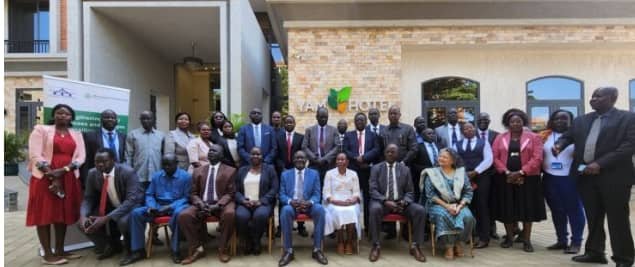The Centre for Inclusive Governance, Peace and Justice (CIGPJ) has initiated a three-day workshop aimed at enhancing the skills of High Court judges and magistrates in managing cases of gender-based violence (GBV) and transitional justice.
The event commenced on Wednesday in Juba and brings together approximately 30 judicial officers from the capital and various states across South Sudan.
Jackline Nasiwa, the executive director of CIGPJ, emphasized that the training builds on extensive prior engagement with survivors of GBV and conflict-related sexual violence. “Most survivors seek justice and legal remedies,” Nasiwa stated. “Chapter 5 of our peace agreement focuses on transitional justice, which includes addressing issues of gender-based violence in conflict scenarios.”
The organization collaborates closely with survivors to ensure their perspectives are integral to the justice process. “We prioritize their needs and advocacy for justice,” she added.
This workshop follows earlier training sessions for judiciary support personnel, which emphasized survivor-centered case management, confidentiality, and safeguarding victim records. Nasiwa highlighted the objective of strengthening the judiciary’s capacity to deliver justice while upholding the dignity of survivors.
“The judiciary is pivotal in delivering justice for survivors,” she remarked. “It is essential to equip judges with a thorough understanding of GBV, its effects, and the trauma that survivors experience.”
One participant shared, “This training is crucial as judges make final decisions that affect survivors and their quest for justice.” Judges are being instructed to implement survivor-centered methodologies in court proceedings, focusing on ethics, confidentiality, and victim protection. An important initiative is to extend this training beyond Juba, where South Sudan’s only GBV court is located, by including judges from various states.
“We are currently facing a landscape of impunity where perpetrators of these crimes often evade justice,” Nasiwa pointed out.
Sheila Keetharuth, the senior women’s protection adviser at the United Nations Mission in South Sudan (UNMISS), highlighted the training’s role in bolstering judicial capability, promoting accountability, and advocating for survivor-centered justice. “Survivor-centered justice prioritizes the rights, needs, and agency of survivors, ensuring they are treated with dignity and respect throughout the legal process,” she explained. Keetharuth noted that survivors, particularly women, girls, and children born from wartime rape, continue to confront stigma, exclusion, and challenges in accessing justice.
Supreme Court Judge Stephen Simon Benjingwa, representing the Chief Justice, encouraged his fellow judges to pursue ongoing professional development.
“It is the policy of the new judiciary leadership that judges engage in continuous learning throughout their careers,” he stated. “As new crimes emerge, ongoing education becomes vital.”
He also stressed the significance of maintaining professionalism, discipline, and proficiency in language. “Let us learn English,” he urged. “It is the official language of the country.”
